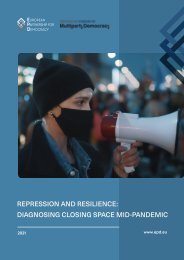Thinking Democratically: A Comprehensive Approach to Countering and Preventing Shrinking Space
You also want an ePaper? Increase the reach of your titles
YUMPU automatically turns print PDFs into web optimized ePapers that Google loves.
6.3 Indonesia<br />
Many have praised Indonesia for the progress made in its first decade of democratic development<br />
after the 1998 reforms. But since the 2014 Presidential Election it has become increasingly clear that<br />
Indonesia’s democratic institutions have inherited corrupt <strong>and</strong> authoritarian ac<strong>to</strong>rs <strong>and</strong> practices<br />
from the old, highly centralised state apparatus, including widespread corruption <strong>and</strong> a party system<br />
driven by private economic interests. The key role of money in politics has led <strong>to</strong> the<br />
commercialisation of political parties, who now act <strong>and</strong> function largely like corporations.<br />
Against this backdrop, political parties in Indonesia eventually became a major fac<strong>to</strong>r behind the<br />
shrinking democratic space in the country, by creating an uneven political playing field between<br />
small <strong>and</strong> big political parties, young <strong>and</strong> old politicians, <strong>and</strong> between men <strong>and</strong> women. They have<br />
done so by tightening the requirements for party registration, increasing the elec<strong>to</strong>ral threshold, <strong>and</strong><br />
at the same time passing regulations that make illicit party finance more difficult <strong>to</strong> detect. In<br />
addition, laws such as the state secrecy bill <strong>and</strong> the bill <strong>to</strong> end direct local elections have also<br />
restricted space for political contestation, thereby limiting avenues for democratic participation <strong>and</strong><br />
accountability.<br />
Indonesia st<strong>and</strong>s out in the region for its vibrant civil society <strong>and</strong> diverse <strong>and</strong> critical press l<strong>and</strong>scape.<br />
While major gains have indeed been made in terms of fundamental freedoms in Indonesia, civic space<br />
has also come under attack from the government through political, administrative <strong>and</strong> legislative<br />
strategies in recent years. Some of these strategies include the criminalization, intimidation <strong>and</strong><br />
stigmatisation of civil society activists through laws, propag<strong>and</strong>a <strong>and</strong> intimidation, as well as<br />
complicated regulations for CSOs operations such as registration, licensing, reporting <strong>and</strong> accounting<br />
obligations. Press freedom has also been restricted through licensing rules, censorship <strong>and</strong> selfcensorship<br />
through laws on blasphemous content. While the constitution guarantees civic <strong>and</strong><br />
political rights for all, in practice minority groups such as religious minorities, atheists, LGBT groups<br />
<strong>and</strong> supporters of Papuan independence do not enjoy these freedoms.<br />
Overall, the primary strategy <strong>to</strong> restrict democratic space has been the creation of an unlevel playing<br />
field, followed by a secondary strategy of attacks on civic space. While impunity reigns regarding<br />
human rights violations in East Timor <strong>and</strong> the killing of HRDs, the rule of law <strong>and</strong> separation of powers<br />
have not been under attack by the government. Finally, the dwindling donor funds <strong>and</strong> shifting<br />
priorities of Western donors have not helped in the efforts of civil society <strong>to</strong> hold political parties<br />
<strong>and</strong> the ruling party <strong>to</strong> account.<br />
54

















